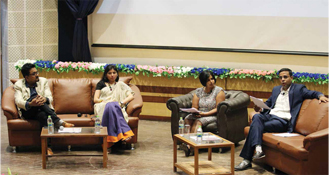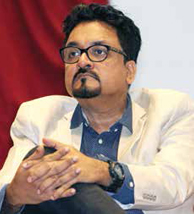As consumers, we are all surrounded by disruption, and when we say disruption, it's not just in business, it could be in religion, in politics, it could be in science. Disruption could be anywhere in the world—disruption exists everywhere in life. However, it is also important to talk about the people or leaders who are enabling these disruptions. It is people out there who are able to self-reflect and have a good understanding of their customers, they are challenging the status quo and importantly they are able to leapfrog into the next big idea or technology and bring it to life in a way that creates value for their customer. In the panel discussion, held recently at the 12th National Business Convention, of Balaji Institute of International Business (BIIB), Pune, panellists - G Pratap, Senior Director-HR, Maersk GSC, Shivani Talesera, Head-HR, Actis Technologies, Dharmesh Parmar, Senior Manager, HR, Oracle, and Prajakta Kulkarni, Head HR (India), Lenovo Global Technology (Moderator), discussed what a disruptive leader is, leadership characteristics and how customers can bring disruption
"In 2050, the world population would be nine billion, out of which 3.2 billion will be in the continent of Africa while 4.5 billion will be in Asia. The average age will be coming down, while in Africa it will be on an upswing. So the disruption that is going to happen from a disruption perspective will be in Africa. Countries like England, New Zealand and Germany they will no longer be Christian dominated countries. Population will drive politics and politics will drive the economy"
—Dharmesh Parmar


Dharmesh Parmar: When I was preparing for this, I thought let me go look at some data. And the first data that I looked at was about population. In 1750, the world population was around 800 million, 100 years later in 1850, the world population was 1.2 billion. It grew by almost 30%; in 1945, almost another 100 years later, it almost doubled to 2.5 billion. In 2017, it was seven billion. In 2050, the world population would be nine billion, out of which 3.2 billion will be in the continent of Africa, while 4.5 billion will be in Asia. The average age will be coming down, while in Africa it will be on an upswing. So the disruption that is going to happen from a disruption perspective will be in Africa. This is one set of data and a couple of other disruptions that will happen are in countries like England, New Zealand and Germany-they will no longer be Christian dominated countries. So if you are going to be a leader who will drive the business or your corporation in these countries, you need to start thinking on what this disruption is going to do.
The reason I wanted to mention population is because population will drive politics and politics will drive the economy. Another data I thought would be interesting is that we are taught to look West, towards US and Europe, but this data will be a little different. If you look at the fortune 500 companies, 126 of them are American companies and 120 are Chinese. If you look at the top ten banks of the world, four are Chinese, that too the top four. So that's one data.
One more data that was very interesting is the reserve currency of the world. The reserve currency of the world today is dollars. I started looking from 1450 to 1530, that is, in a span of 80 years, it was Portuguese and the next 110 years it was Spanish, and after Spain it was the Dutch, which was the reserve currency for the next 80 years from 1640 to1720. After the Dutch, it was the French. Theirs was the dominant currency for the next 95 years, from 1720 to 1850. After the French, it was England for another 105 years and 1920 onwards it is the US dollar. If you look at the previous years the average span is around 100 years. The US currency is touching the 100th year. After that, no one knows it may be crypto currency. It's a disruption that's going to happen and we as leaders should be conscious of this.
Another data point is that the cost of living is going to come down as our mobile phones have replaced a few items. I think the cost of living is going to come down because 3D printing is going to replace a lot of manufacturing activities. There are already companies who are constructing buildings, which are 70% cheaper and 50% faster to complete. So think about the industry you want to step in and about the disruption in it. These are the points I thought would be good for students, which will provoke them to think about the next disruption.
"When you grow globally and you have organizations and offices in 22 countries, it impacts the overall revenue. Disruption is the need of the hour because we all have to deal with it. It impacts our daily life and business. We need to choose the industries and sectors growing in the future"
— Shivani Talesera

Shivani Talesera: An insightful point that should be thought of is the way the world is moving towards digitization. There is disruption in every sector. I think we are disrupting unknowingly or knowingly. It is not happening only today, probably it has been happening earlier too. It is just that the pace has increased now, the buzz is more and the reason for it is the kind of ever changing environment in which we are surviving. Everyday there new things that happen. Any technology that comes today, gets the next version very fast. You get something more with better features, with better pricing and that is where the disruption is coming. That's why startups are coming up.
What is the ultimate goal of any organization? There are certain sets of revenues that we are trying to generate, there are certain sets of business models that we are running. We are organizations running with the same set of business model maybe for years but there is a point at which we start changing and so we have to put up a new strategy to it. Every aspect of the business requires a new strategy so that we can get something that is more productive. It can save our time and yet get the better results. Hence it affects every individual personally. And with the ever changing environment we need to survive. It looks close to innovation but it is not yet as important an aspect.
In my career journey I have seen a couple of disruptions that might not be as innovative as the data Dharmesh points out, but it does happen. I have worked for an Indian organization and I have seen the organization grow from few thousands to say, 14,000 employees and how things changed in the organization and how the disruption came. We as an Indian organization have started with a particular way of working, wherein the focus was more on people and business at the same time. But when you grow globally and you have organizations and offices in 22 countries, it impacts the overall revenue. Disruption is the need of the hour because we all have to deal with it. It impacts our daily life and business. We need to choose the industries and sectors growing in the future. So that is my point of disruption and that is where leadership comes into the picture.
"Our IT industry forgets programming after eight years and now such people are losing their jobs left, right and center. We are also seeing automation happening; a lot of jobs which were there earlier are not there anymore. Robots will replace humans because they are becoming smarter than humans and more predictable than humans. There are companies bringing robots everyday to replace humans"
— G Pratap

G Pratap: You have already heard about disruption and the data shared and the prospectus given was an introduction as to what the larger picture looks like. So how are you disrupting yourself and how you're preparing yourself to disrupt the companies you are getting into? The point is when we talk about disruption when we talk about agility a lot of things are going to happen in the corporate world. So if you want to be selected by a company you have to be agile. Courser and Udemy are the universities of the future. Are you disrupting yourself by creating a learning mind-set not just in college but also in futuristic learnings in these places? The leaders are looking at people like you who could write algorithms in different software. That's what people are looking for-for people who would come in and disrupt or enable disruption.
Let me share a story in terms of disruption and leadership. We wanted to hire a CEO who could come in and disrupt the company in a big way. So we hired gentleman who used to run Target India, one of the biggest retail chains of the US. So this gentleman came in and looked at three or four different things. He set up a digital center in Bengaluru to take the IT infrastructure to a completely different level. At senior leadership,60% of people do not succeed predominantly because of culture related challenges. So people like him come in and create or rather disrupt.
Just to list a few things, changing the operating model from a water-flow methodology to a completely agile way of working, not just for the area he was responsible for, but also for the larger company-that's disruption. Number two, setting up the center I talked about. Significantly looking at moving things like data related to technology into platforms, which are very futuristic. Working on the larger cultural aspects of the organization along with leaders to get into areas which require disruption. Hence if you're able to disrupt the organization, bring in the kind of DNA to influence larger leadership and take up global roles. By this I just wanted to give a flavor in terms of what is disruptive leadership and how leaders create disruptive organizations.

If you are not clear in your mind in terms of how you are disrupting, there could be a disconnect when you sit in front of these companies for an interview. It is high time to look at our mind building and at disruptive DNA. To look at areas where you are comfortable and bring in the healthy discomfort in those areas that's the basic way to start to disrupt yourself and then keep looking at what your goal is. Because there will no more be ‘I'm from marketing’, or ‘I’m from HR’. Everyone will become a technology leader or has to become a technology leader. You need to have knowledge of all the fields because those are the people who will go places. The middle layer of managers will be completely frozen. They are going to go away very soon and the VP's will start working with top IT talent directly.
Can you imagine, our IT industry forgets programming after eight years and now such people are losing their jobs left, right and center. We are also seeing automation happening; a lot of jobs which were there earlier are not there anymore more. Even AI is a little distant pure automation, that is, robots will replace humans because they are becoming smarter than humans and more predictable than humans. There are companies bringing robots everyday to replace humans.
By HARSH THIND